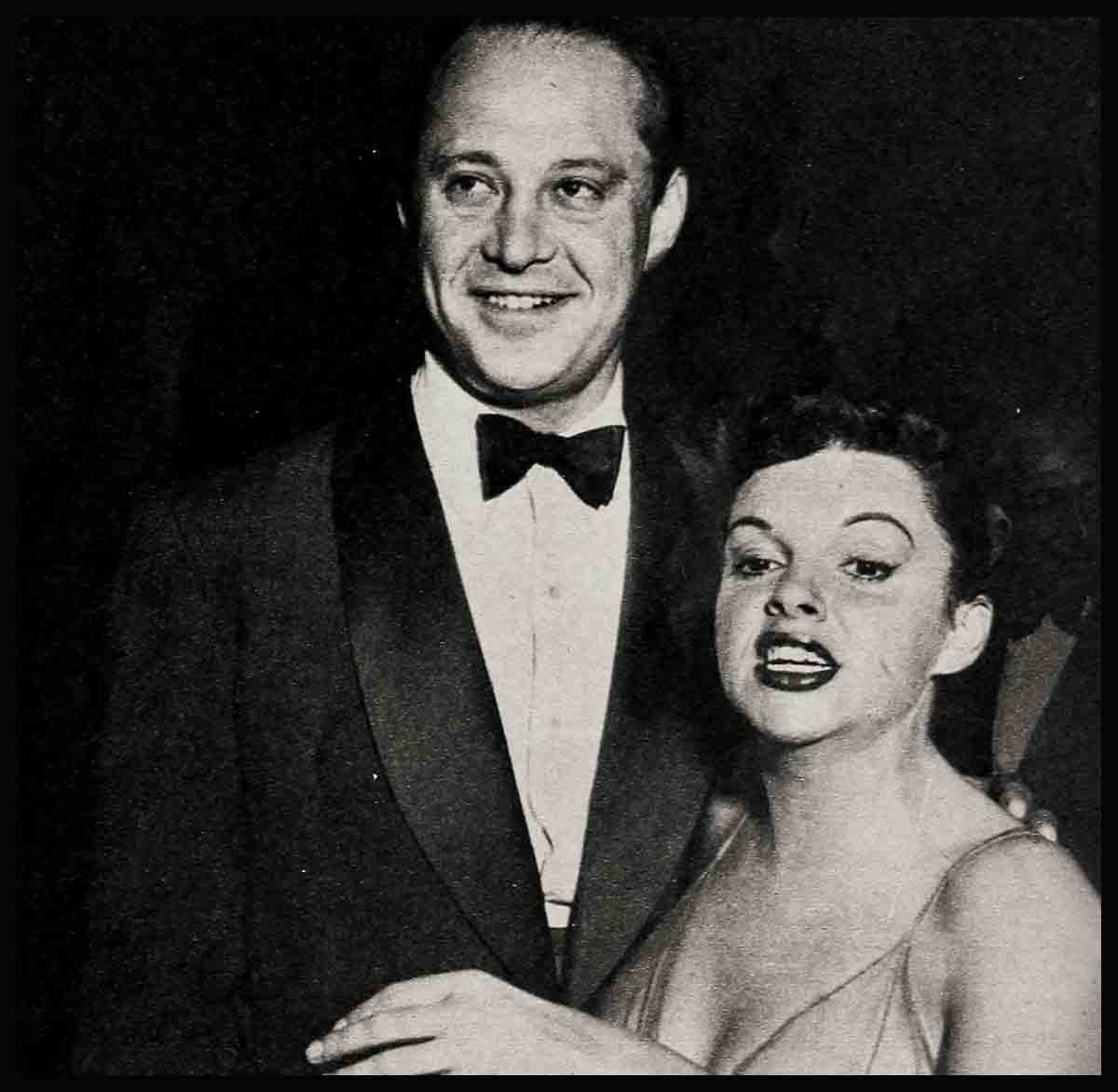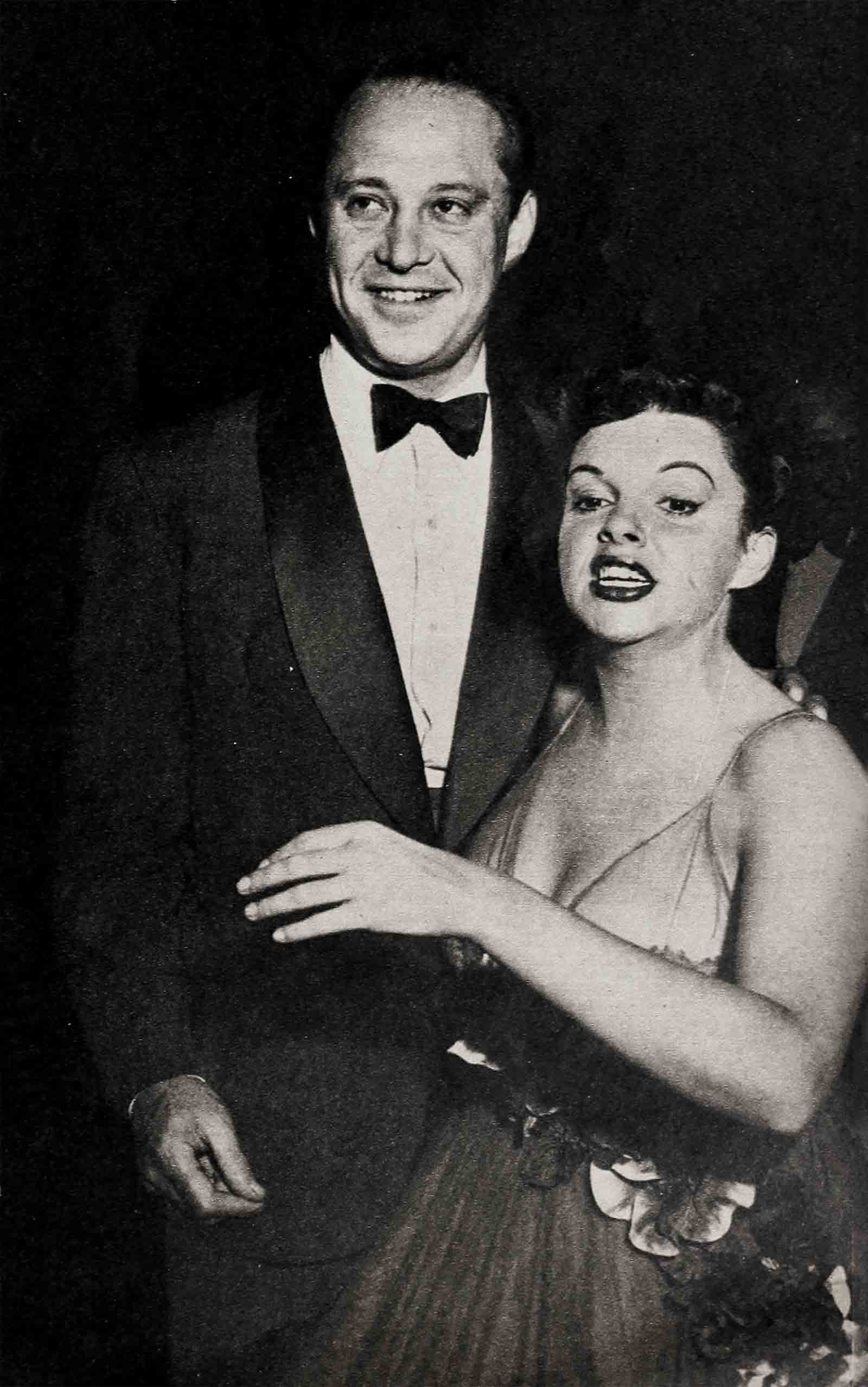
Number Three For Judy Garland
Judy Garland has done it again!
For the third time in ten years, the lovable, muddled little girl with the slightly bowed legs. The tragic past, the arched, penciled eyebrows, and the incomparably great voice, has gone and gotten herself married.
The groom, as everyone knew it would be, was her manager, Sid Luft, a smooth young man of thirty-six.
The marriage was top secret, strangely unromantic, and hurried.
It took less than five minutes and was performed on Judy’s 30th birthday at the ranch of Bob Law, a millionaire California oilman.
Judge Pappy Hain, who married the couple, said, “It was over like that. Mr. Luft wanted it swift, sweet and simple, and that’s the way I gave the ceremony.”
Just why Judy and Sid wanted to keep their marriage such a big secret, they aren’t saying. Judy’s explanation is, “Everyone knew we were going to get married eventually, so we saw no point in making a big fuss over it.”
Others say it was because Luft was facing a legal suit and was afraid that, as Judy Garland’s husband, the court would order him to pay his ex-wife Lynn Bari more than it did.
As a matter of fact, Judy’s third marriage might still be a secret had it not been for the alertness of a reporter from the Hollister Evening Free Lance who happened, in perusing a list of marriage license applicants, to come across Judy’s real name, Frances & Gumm Minnelli.
It was under that name that Judy on Sunday, June 8th. applied for a license in Hollister, California, a city not too far away from San Francisco where Judy spent the month at the Currant Theatre, continuing her sensational stage comeback.
The license clerk, Katrina Lynn, says, “I didn’t recognize Judy at all. She was wearing slacks and a large pair of dark glasses and her hair was tied in a bun at the back of her head. She and this fellow Luft applied for a license, and then they rode off to some ranch about 20 miles south of here.”
It was a record-breaking ceremony, but at least Judy didn’t get married in slacks. She wore a short-sleeved dress of navy blue but was hatless.
After the ceremony, which took place at four in the afternoon, the couple spent the night at Law ranch, then drove back to San Francisco. Judy remained to carry on with her act, and Luft returned to Hollywood where all hallelujah broke loose.
The day after the wedding, Sid was hailed into the California Superior Court where he was ordered to double the $200 monthly payments he makes to his ex-wife, actress Lynn Bari, for the support of his three-year-old son, John.
When Luft turned up in court with his attorney, he told no one of his marriage to Judy, and the supposition was that he and the singer were still engaged.
Luft was put on the stand and was asked about his financial position. He was a most uncooperative witness, and he angered the judge so much that the Bench termed his testimony “guarded, evasive . . . and nowhere near the truth,” which is strong language indeed from a Superior Court judge.
On occasion Sid’s sense of humor gets the better of him, and this oftentimes works against him. For example, Miss Bari’s lawyer asked Luft about a motion picture manuscript entitled Man o’ War, which Sid’s company purportedly owns.

“Is this a manuscript or a book?” the attorney inquired.
“It’s a horse,” Luft snapped.
The attorney, little Sammy Hahn, blew his top at that. remark. The reply, he said, was typical of “the man’s character—to give such an answer under oath in a court of law. A horse,” he continued, “that’s what we’re talking about. This man, who is too poor to pay more than $200 a month for his son, can feed three horses. When a man can feed and shoe horses, he can feed and shoe his own child.”
Hahn then got around to Judy, whom he had subpoenaed into a court a month before. “She’s a little Charley McCarthy,” he asserted. “This girl gives him all her money. He can write as much of a check as he wants. He lives high.”
The judge said that he thought Miss Garland had told the truth when she testified that she paid Luft a salary of $500 a week as her manager. “She’s very vague about business matters,” he said.
He then studied a list of expenses which Lynn Bari had made out as necessary for the support of her son: $200 a month for a governess, $75 a month for rent, $50 a’month for nursery school, $50 a month for food and $25 for clothing.
He ordered Luft to pay these. When Judy heard about this in San Francisco she said nothing. But then came the delayed, reluctant announcement by Bob Law that Judy and Sid had been married at his ranch.
Back into court marched little Sammy Hahn, charging that inasmuch as Sid was married to Judy when he appeared in court, he should be held in contempt, as he had failed to disclose that fact.
“My client’s original complaint,” the lawyer said, “alleged that Luft and Judy Garland were in a partnership, and that last year the partnership had earned more than $750,000. When they both came to court, Miss Garland denied it. Luft denied it, too, which was-all right, because they weren’t married then.
“But they got married on Sunday, and three days later Luft came to court still denying, still pleading poverty.
“Under California law, the day they were married he immediately got half her income. That makes him half a millionaire.”
Hahn petitioned for a new hearing, and it may well be that Luft’s payments for support will coincide with his increased ability to pay.
Judy says that her marriage to Sid “is the most wonderful thing in the world,” and it is no secret that she credits her husband with the success of her comeback.
After all the trouble she’s known in her young life, however, it seems ironic that three days following her third wedding, Judy should be back in the headlines because of her new husband’s legal difficulties.
She ‘herself had no trouble whatever in arriving at a quick financial settlement with her second husband, director Vincente Minnelli. She paid him $25,000 for his share of their house in the Hollywood hills, and he agreed to pay her $500 a month for the support of their five-year-old daughter, Liza.
Moreover, Judy’s relationship with her former husband is warm and friendly. “Vincente,” she says, “is one of the nicest and kindest human beings I’ve ever met.”
Lynn Bari’s opinion of Sid Luft, however, is entirely different.
In all honesty, it must be reported, that the prevailing opinion in Hollywood is that the marriage will last two or three years, no longer.
A director who has known Judy for years says, “My own feeling is that Judy is now in a state of dependency. I caught her act in Los Angeles, and I was at Romanoff’s for the after-show shindig, and she still seems very neurotic to me. What that kid needs is a first-rate analyst, not a husband. She’s been mixed up ever since she was a child, and I don’t think she understands herself yet. As for Luft, he’s a nice enough guy. But you know what happens when a husband is dependent upon his wife’s talent for his main support. After a while he begins to resent her. Subconsciously he accuses her of depriving him of his manhood, of his self-respect.
“I remember a guy by the name of Harmon Nelson, who was married to Bette Davis. Ham earned his own living, too. He had an orchestra, but Bette was so domineering that he couldn’t take it. After ten years he threw in the sponge. Judy isn’t domineering. If anything, she’s the opposite; she’s ultra-dependent and emotionally immature. But let’s face it. Suppose she got sick tomorrow. What would Luft have to manage?
“I don’t want to sound like a pessimist. But it just doesn’t seem like a healthy setup to me. I love Judy, and I pray to God I’m wrong.”
Myrtle Tully, Judy’s secretary, says, “I think Judy and Sid came along for each other exactly at the right time. Both needed help. They found it in each other. They get along very well. Judy’s matured a lot these past few years, and Sid has been the man behind that improvement. No matter what anyone says, I’m sure it will be a good and lasting marriage.”
For any marriage to be lasting, both partners have to contribute to each other’s welfare. In this marriage, Luft is proving to Judy that she is a highly desirable woman whom he loves for herself rather than for her talent.
THE END
—BY ARTHUR L. CHARLES
It is a quote. MODERN SCREEN MAGAZINE SEPTEMBER 1952




